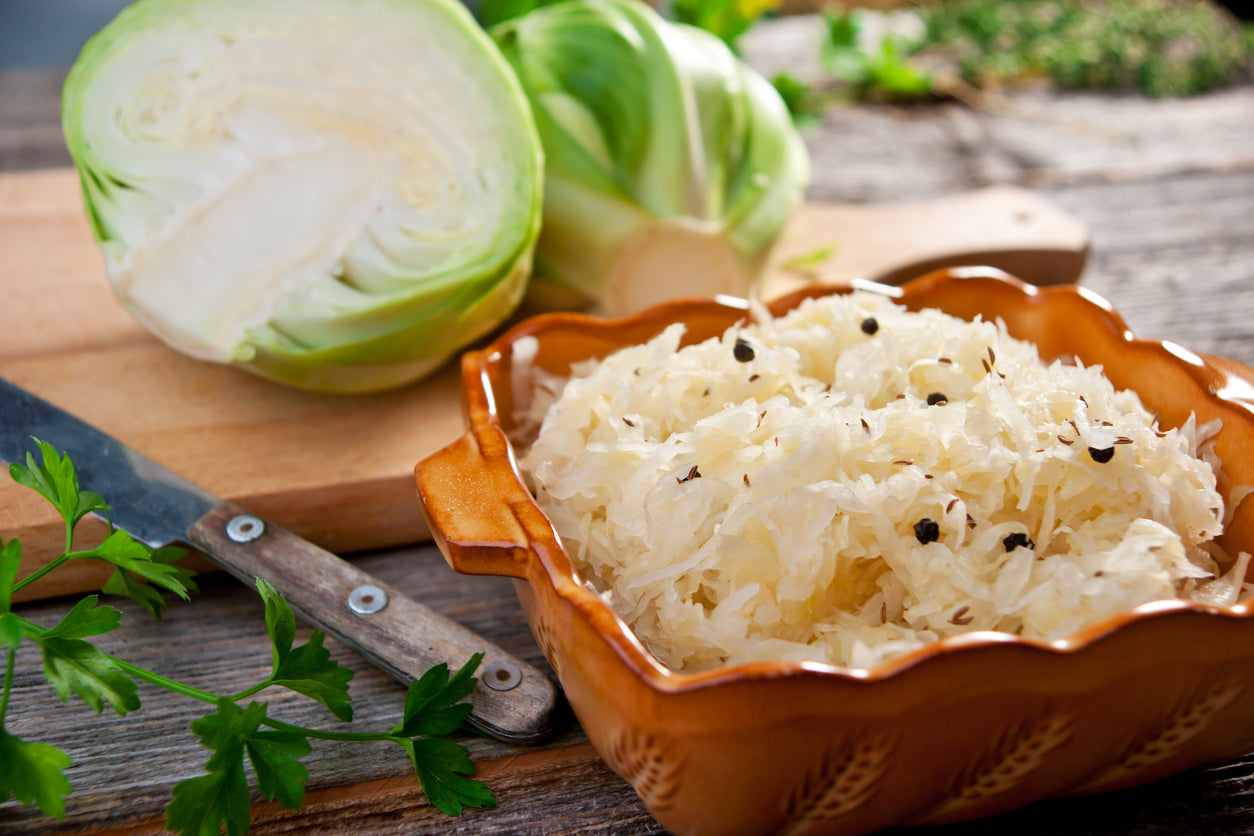Can sauerkraut really make you smarter and happier?

Even true fans - those who can’t imagine a hot dog unless it’s smothered with sauerkraut – may not realize the true nutritional merit of this savory, down-to-earth delicacy. The fact is: sauerkraut is packed with beneficial microbes that are vital to the health of the all-important gut microbiome, the community of bacteria in the intestinal tract.
Researchers have learned that “friendly” bacteria in the microbiome play an indispensable role in immune system defenses, healthy digestion, and the absorption of essential vitamins and minerals. Surprisingly, the benefits even extend to psychological and mental well-being. Recent research shows that specific strains of bacteria found in sauerkraut can improve cognition, lift mood and even combat depression.
Changing the composition of the microbiome can alter your mood and behavior
Sauerkraut contains 30 different strains of bacteria, including those from the highly beneficial Lactobacillus and Bifidobacteria groups. These two genera of bacteria have been the subject of extensive study for their impressive effects on immune health, digestion, and treatment of inflammatory bowel conditions.
In influential research conducted at University College, Cork, neurobiologist John Cryan demonstrated that gut bacteria produce an array of compounds that affect the mind. For example, Bifidobacteria enhance the production of butyrate, an anti-inflammatory substance that also exerts antidepressant effects. Other strains of bacteria produce tryptophan, a precursor for the neurotransmitter serotonin, which is needed for stable mood and restful sleep.
Recent research supports Cryan’s work. For example, an animal study published in 2020 in Science Reports showed that a strain of Lactobacillus helped enhance cognition and performance.
In a review of randomized controlled trials published in the Journal of Neurogastroenterology and Motility, researchers reported that Bifidobacteria and Lactobacillus were effective against a wide variety of psychological conditions, including anxiety, depression, OCD, and autism spectrum disorder. Intriguingly, the probiotics also improved both spatial and non-spatial memory.
Finally, a 2017 study suggested that a diet higher in beneficial bacteria banished depression in over a third of the volunteers. So, clearly, probiotics hold exciting potential for helping to treat mood disorders.
Discover WHY sauerkraut is so valuable to your health
Cabbage, the primary ingredient in sauerkraut, is a true superfood - a cruciferous vegetable high in cancer-fighting compounds known as glucosinolates. The fermentation process involved in making sauerkraut adds yet another layer to its nutritional “superpowers,” as microbes, yeast, and bacteria in cabbage digest its sugars and convert them to beneficial organic acids.
A one-cup serving of sauerkraut contains four grams of cancer-fighting fiber, along with 15 percent of the recommended daily intake of vitamin K and roughly ten percent of the RDI for iron, manganese, folate and vitamin B6.
While a cup of cabbage contains a modest 30 mg of vitamin C, fermentation into sauerkraut causes vitamin C content to skyrocket - so that the same cup contains a whopping 600 mg of this powerful antioxidant nutrient. Known as the “muscle of the immune system,” vitamin C plays an important role in the body’s defenses against poor health.
Sauerkraut also contains lutein and zeaxanthin, disease-fighting carotenoids which filter harmful rays from “blue” light and help prevent macular degeneration. No doubt, at a scanty 27 calories a cup, sauerkraut is a true nutritional bargain.
Promote heart health, digestion, and immune defense with sauerkraut
In addition to its other benefits, sauerkraut promotes cardiovascular health. Some studies have shown that it can reduce LDL cholesterol, lower blood pressure, and help maintain a healthy weight. Due to its fermentation, it is also rich in vitamin K2, which has been linked with a 57 percent lower risk of dying of heart disease. Its healthy content of folate may help prevent strokes.
With over 70 percent of the immune system located in the gut, the connection between good bacterial balance in the microbiome and immune system health is clear. In fact, sauerkraut contains a specific type of Lactobacillus bacteria, Lactobacillus plantarum, that actively destroys pathogenic (disease-causing) bacteria.
Finally, sauerkraut helps to produce digestive enzymes, facilitating the breakdown and absorption of food. Yet another helpful Lactobacillus species, Lactobacillus acidophilus, helps to maintain the integrity of the lining of the gut. Natural healers often advise probiotic-rich sauerkraut to help relieve gas, bloating, diarrhea, and abdominal cramps that can accompany inflammatory intestinal conditions such as Crohn’s disease and ulcerative colitis.
Experts agree: Fresh, unpasteurized sauerkraut is the way to go
For maximum benefit, forget about the canned products on the supermarket shelves – and opt for unpasteurized, refrigerated sauerkraut that is free of preservatives and added sugar. (In fact, the only ingredients should be cabbage and sea salt).
If you decide to take supplementary probiotics, holistic health experts typically recommend at least 10 million colony-forming units (CFUs) a day for up to eight weeks. However, always check first with your holistic healthcare provider before making any changes to your diet or supplement routine.
Although sauerkraut may be somewhat overlooked as a “superfood,” this hearty, homey favorite is emerging as a nutritional superstar with cutting-edge health benefits for both the body and the mind.
Sources for this article include:






